The recent news
July 5, 2023
Interviews

♾️follow Marie-Anne Frison-Roche on LinkedIn
♾️subscribe to the Newsletter MAFR Regulation, Compliance, Law
____
► Full Reference: M.-A. Frison-Roche et A. Seban, "Compliance : les cours suprêmes s’emparent de la question de ses enjeux juridictionnels" ("Compliance : the Supreme Courts take up the issue of its jurisdictional implications"), interview with Olivia Dufour, Actu-Juridique, 5 July 2023.
____
💬read the interview (in French)
____
► Presentation of the interview by the journal (in French): "Le 2 juin dernier s’est tenu au Conseil d’État un colloque fondateur sur le rôle du juge dans la compliance. Le professeur Marie-Anne Frison-Roche et le conseiller d’État Alain Seban, qui ont tout deux contribué aux débats, ont accepté de commenter les principaux enseignements des travaux de cette journée."
____
► Questions asked (in French):
- Le colloque « De la régulation à la compliance, quel rôle pour les juges » qui s’est tenu au Conseil d’État le 2 juin dernier a rassemblé juges civils et administratifs. En quoi le juge administratif est-il concerné par la compliance qui semble plutôt une affaire d’entreprises et donc de justice civile et commerciale ?
- Vincent Vigneau, président de la chambre commerciale de la Cour de cassation rappelle que la compliance a plutôt vocation à éviter le juge en se situant ex ante, pourtant on découvre que le juge lui-même accepte de plus en plus de se prononcer en ex ante… qu’en est-il ?
- Quel peut donc être le rôle du juge dans la compliance ? Peut-il contribuer à faire émerger un droit de la compliance et à l’harmoniser ?
- François Ancel semble considérer que le rôle juge va devoir adapter son office à la compliance, il évoque trois concepts : téléologique, soutenabilité et efficacité…
- Le juge dispose-t-il en l’état de tous les outils nécessaires ? Si tel n’est pas le cas, que faut-il créer ?
- En quoi le dialogue des juges, civil/administratif, national/européen, national/international, est-il important ?
- Que veut dire F. Ancel quand il déclare que le juge doit évoluer du constat à la trajectoire ?
- Existe-t-il des domaines où la compliance entre en conflit avec des principes processuels, par exemple le principe de légalité des peines ?
- En quoi la notion de « buts monumentaux », que vous avez créée en 2016, a-t-elle trouvé sa place dans le droit ?
________

June 21, 2023
Publications

♾️follow Marie-Anne Frison-Roche on LinkedIn
♾️subscribe to the Newsletter MAFR Regulation, Compliance, Law
____
► Full Reference: M.-A. Frison-Roche, Conditions required to promote the "contractualisation" of the Law, Working Paper, June 2023.
____
🎤This Working Paper has been done as a basis for the closing conference of the colloquia La contractualisation du droit. Acte II, organised by the Société de législation comparée (SLC) and the Procuradoria Geral do Estado do Rio de Janeiro (PGE-RJ), on 19, 20 and 21 June 2023.
____
📝It is also the basis of the article that will be published.
____
► English Summary of the Working Paper :
____
🔓read the Working Paper⤵️
June 21, 2023
Conferences
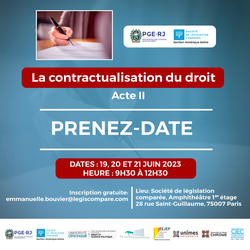
♾️follow Marie-Anne Frison-Roche on LinkedIn
♾️subscribe to the Newsletter MAFR Regulation, Compliance, Law
____
► Full Reference: M.-A. Frison-Roche, "Favoriser ou pas la « contractualisation » du Droit" ("To favour or not the "contractualisation" of the Law"), final speech in Société de législation comparée (SLC) and Procuradoria Geral do Estado do Rio de Janeiro (PGE-RJ), La contractualisation du droit. Acte II, Paris, 21 June 2023.
____
🧮See the full programme of this event (in French).
The conference is held in French
________
June 19, 2023
Conferences
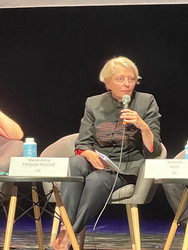
♾️ follow Marie-Anne Frison-Roche sur LinkedIn
♾️subscribe to the Newsletter MAFR Regulation, Compliance, Law
____
► Full Reference: M.-A. Frison-Roche, participation in the panel "Vigilance (due diligence)", in International Law Association (ILA), 150th Anniversary Symposium of the ILA/ADI, Paris, 19 June 2023.
____
🧮See the full programme of this event
________
June 16, 2023
Conferences
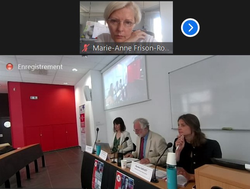
♾️ follow Marie-Anne Frison-Roche on LinkedIn
♾️ subscribe to the Newsletter MAFR Regulation, Compliance, Law
____
► Full Reference: M.-A. Frison-Roche, "L'usage des puissances privées par le droit de la compliance pour servir les droits de l’homme" ("The use of private forces by Compliance Law to serve human rights"), in Joel Andriantsimbazovina (dir.), Puissances privées et droits de l'homme, University of Toulouse, 16 June 2023.
____
🧮Read the full programme of this event
________
June 14, 2023
Conferences
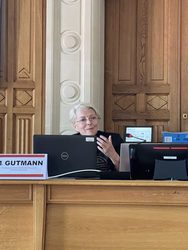
♾️follow Marie-Anne Frison-Roche on LinkedIn
♾️subscribe to the Newsletter MAFR Regulation, Compliance, Law
____
► Full Reference: M.-A. Frison-Roche, "Compliance et droit processuel" ("Compliance and Procedural Law"), in B. Deffains, M.-A. Frison-Roche and J.-B. Racine (dir.), Journal of Regulation & Compliance (JoRC) and University Panthéon-Assas (Paris II), Compliance : Obligation, devoir, pouvoir, culture (Compliance : obligation, duty, power, culture), University Panthéon-Assas, Salle des Conseils, 14 June 2023.
____
🧮See the full programme of this event
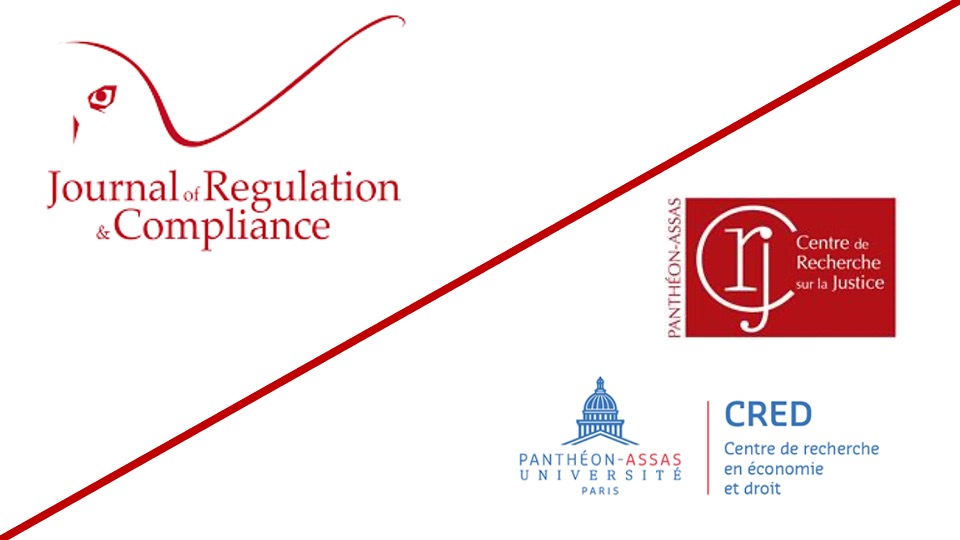
____
🎤see the other speech made during the first day of this symposium : "L'obligation de compliance, entre volonté et consentement : obligation sur obligation vaut" ("Compliance Obligation, between will and consent: obligation on obligation works")
____
► Summary of the conference: After referring to the chapter in the book Compliance Jurisdictionalisation, which deals more specifically with Procedural Law!footnote-2987, the conference is built around 5 developments, each of which represents a progression.
The first development relates to the fact that the relationship between Compliance Law and Procedural Law is very difficult because it is often said that they simply have nothing to do with each other, or that they have everything to dislike each other. This is because Compliance is often reduced to processes, and to the mechanical place that algorithms could take in it, in taking care of everything.
Compliance would even have the purpose and effect of ensuring that the company and its managers never come into contact with a judge, the public prosecutor being their best ally in this respect.
Secondly, I recalled the very common idea that Procedural Law is a kind of 'tribute' that the rule of Law demands, which certainly weighs down companies when compared with companies living in systems in which there's not not such a price.
But many stress that Procedural Law could become a model. This can be justified and technically anticipated because it has already happened in Regulation Law, and Compliance Law is the deployment of it!footnote-2988.
In the third stage, I worked on the alliance between the two, with the procedure (rather than the process) modifying compliance and thereby reinforcing it, evoking the way in which this can manifest itself technically!footnote-2989.
In the fourth step, I looked for what would be the "naturally appropriate procedure" for Compliance: one that takes into account the duration and the development of "solutions", to which the notion of "sustainability", which is central in the substantive Law of Compliance, refers.
In a fifth stage, and devoting more time to this, I have pointed out where innovation should be the strongest: the proof, the probatory obligation being the "part totale" ("total part") of the compliance obligation. This major issue will be the subject of a series of symposiums held in 2024.
________
June 14, 2023
Conferences
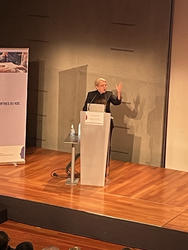
🌐follow Marie-Anne Frison-Roche on LinkedIn
🌐subscribe to the Newsletter MAFR Regulation, Compliance, Law
____
► Full Reference: M.-A. Frison-Roche, "L'esprit des Lois en matière de vigilance" ("Spirit of Law in Vigilance (Due Diligences) matters"), in Haut Conseil du Commissariat aux Comptes (H3C), Réalités et défis de la CSRD - Perspectives du devoir de vigilance, Paris, 14 June 2023.
____
🎥watch the video of a part of the speech (in French)
____
🧱read the description of the speeches of other speakers of this panel (in French)
____
The speech took place during the third-round table devoted to the Perspectives du devoir de vigilance (Perspectives of the duty of vigilance), the first round table having been devoted to the lessons that the DPEF can provide for the CSRD, and the second to the transposition work of the CSRD.
🧮See the full programme of this annual event (in French)
____
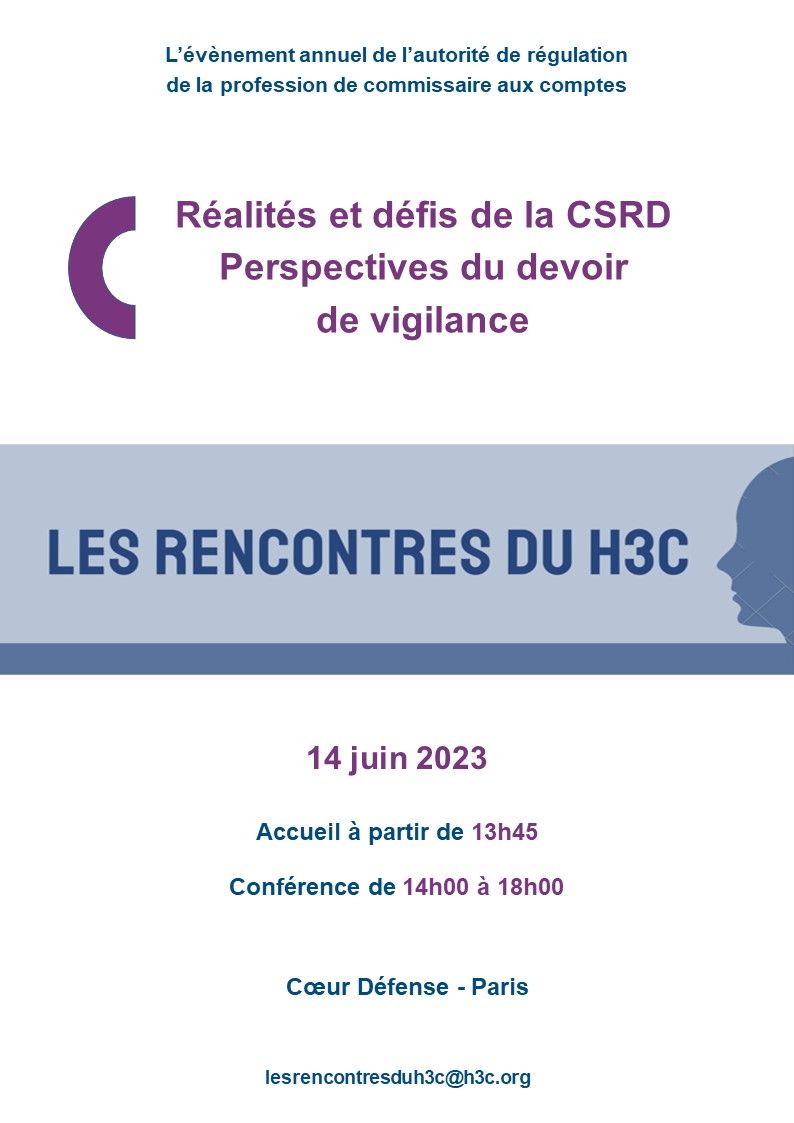
► English summary of the speech: In consideration of and in addition to what has been said, explained and even affirmed by other speakers, I have emphasised that 'vigilance" laws is not a 'regulation' like any other, but the leading edge of a very vast movement, Compliance Law, in which the 2017 French law is the driving force. For its application, the Judge, who is at the centre because of the will of the Legislator, is already taking into consideration the CS3D, the twin text of the CSRD.
The texts must not be seen in isolation. If we isolate them from each other, they become almost incomprehensible, their meaning appearing uncertain, even threatening: we need to understand the spirit of these texts, which are indeed new, because they aim to provide answers to the new world we have entered. We must all rejoice in this political ambition, which is taking a legal form, and work to make it efficient: Legislators, companies, auditors, Regulators and Judges.
If we do not stop at the letter, which would be to reduce Compliance to conformity, whereas Compliance Law, particularly Vigilance, is the extension of Regulation, finds its meaning in the Goals, we see that the French law of 2017, known as the "Vigilance law", which copies all the techniques of the French law known as "Sapin 2", gives goals simple to understand to the companies subject to the Legislator's will: detect and prevent environmental and human rights abuses in the value chains.
The logic is therefore Ex-Ante.
This Ex-Ante logic is retained by the CS3D directive.
The Judge is central to it. But the responsibility which the NGOs will ask him to trigger is itself an "Ex Ante responsibility", the Compliance trials being like "accountability" trials, to ensure that companies act in accordance with the Goals set by the Legislator.
This is transforming the role of the Judge, who must find effective solutions for the future. The discussion and the adversarial principle will become more important. Mediation will be encouraged. Stakeholders and the company will have to work together, and this method, which was intended by the Legislator for drawing up the vigilance plan, will be continued in the supporting legal proceedings.
This will also transform the company, and the role played by those who accredit the information on the company's actions and long-term strategies: auditors therefore have a central role to play.
________
June 13, 2023
Conferences
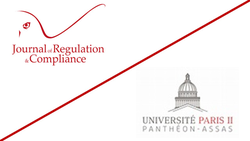
♾️ suivre Marie-Anne Frison-Roche sur LinkedIn
♾️s'abonner à la Newsletter MAFR Regulation, Compliance, Law
____
► Référence complète : M.-A. Frison-Roche, "L’obligation de compliance, entre volonté et consentement : obligation sur obligation vaut", in B. Deffains, M.-A. Frison-Roche et J.-B. Racine (dir.), Journal of Regulation & Compliance (JoRC) et Université Paris Panthéon-Assas, Compliance : Obligation, devoir, pouvoir, culture, Université Panthéon-Assas, Salle des Conseils, 13 juin 2023.
____
🎤consulter la présentation de l'autre conférence faite lors de la seconde journée de ce colloque : "Compliance et Droit processuel"
____
🧮Consulter le programme de cette manifestation
____
► Présentation de la conférence : Le Droit des contrats noue le "consentement" et la "volonté", puisque le consentement est ce qui manifeste la volonté d'une personne, en marque la liberté et l'engagement, en constitue la trace et la preuve. En 1995, j'ai montré que le Droit économique avait distingué le consentement et la volonté, pour rendre les consentements autonomes et en faire des marchés, notamment dans le Droit de la concurrence et le Droit financier📎!footnote-2980. Or, le consentement si on le transporte en objet, autonome, devient le signe d'une obéissance mécanique, ce qui produit des effets dont le système juridique, si l'on est dans un système libéral et démocratique, doit tenir compte d'une façon centrale. Le Droit économique lui-même doit mettre cela au centre, ce qu'il ne fait guère, notamment par la distinction, néfaste, des branches du Droit.
Puis en rendant hommage à Pierre Godé qui avait fait sa thèse sur la volonté📎!footnote-2982, j'ai montré en 2018 que les "consentements mécaniques" étaient la base de beaucoup d'industries dans l'espace numérique📎!footnote-2981. Les Autorités publiques de supervision et de régulation mis en place en matière de Compliance, par exemple en France la CNIL, ont eu pour mission et pour jurisprudence de sauvegarder ce lien entre le consentement et la volonté.
Mais la difficulté à comprendre le système général du Droit de la Compliance vient de la confusion souvent faite entre celui-ci et ce qui n'est qu'un de ses outils : la conformité. Or, la conformité est l'obligation pour un sujet de droit, certaines entreprises de donner à voir en Ex Ante qu'elles obéissent activement à la réglementation qui leur est applicable. J'ai montré en 2016📎!footnote-2983 que le Droit de la Compliance ne doit pas se définir par l'obéissance mécanique mais comme la compréhension de la Volonté du Législateur qui vise des Buts, l'entreprise contribuant à la concrétisation de ceux-ci.
Les entreprise qui sont sujets du Droit de la Compliance ne sont alors pas toutes les entreprises, ni celles qui seraient "coupables" par avance, mais celles qui "sont en position" d'atteindre les buts : les "entreprises cruciales", notion que j'ai proposée en 2006📎!footnote-2984. C'est donc dans une perspective systémique et en Ex Ante que le Droit de la Compliance se développe, le Droit de la Compliance étant le déploiement du Droit de la Régulation, comme je l'ai montré en 2017📎!footnote-2985.
Il demeure que les entreprises, qui entrent dans le commerce juridique par leur personnalité juridique, peuvent elles-aussi exprimer leur volonté et non pas seulement consentir. Elles le font non seulement dans la mise en œuvre, ce que la Volonté du Législateur leur demande, mais encore en édictant des Buts, là où se loge la normativité du Droit de la Compliance.
C'est là où l'on doit affirmer dans un nouvel adage : Obligation sur Obligation vaut.
En effet, si l'entreprise exerce sa puissance juridique non seulement sa capacité à obéir (consentement), ce qui est une puissance faible, mais encore en exerçant leur puissance pour l'effectivité, l'efficacité et l'efficience des Buts Monumentaux du Droit de la Compliance, les systèmes et les êtres humains qui y sont impliquées en sont les bénéficiaires.
C'est pourquoi dans une conception générale du "pouvoir" que j'ai dessinée pour rendre hommage à Emmanuel Gaillard qui avait consacré sa thèse à cette notion📎!footnote-2986, l'entreprise déploie sa volonté libre et autonome, le consentement, y compris celui des tiers qui dépendent d'elles, convergeant vers la concrétisation des buts. Le contrat devient l'outil premier.
Le sujet premier devient alors en théorie et en pratique l'articulation entre la Volonté du Législateur (la "réglementation" applicable) et la Volonté des entreprises cruciales. Ce point sera particulièrement développé lors de la conférence.
La dimension probatoire de la question sera plutôt développée le lendemain dans la conférence qui, dans le cadre de ce cycle portant sur L'Obligation de Compliance, portera sur Compliance et Droit processuel.
_____________________________
La conférence est construite en trois temps :
III. OBLIGATION SUR OBLIGATION VAUT
________